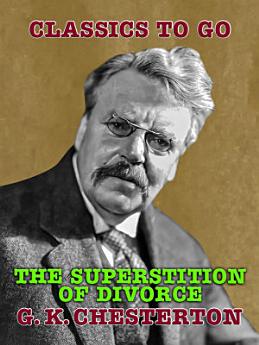The Superstitions of Divorce
Jul 2021 · Otbebookpublishing
5.0star
1 reviewreport
Ebook
65
Pages
family_home
Eligible
info
reportRatings and reviews aren’t verified Learn More
About this ebook
Excerpt: "It is futile to talk of reform with reference to form. To take a case from my own taste and fancy, there is nothing I feel to be so beautiful and wonderful as a window. All casements are magic casements, whether they open on the foam or the front-garden; they lie close to the ultimate mystery and paradox of limitation and liberty. But if I followed my instinct towards an infinite number of windows, it would end in having no walls. It would also (it may be added incidentally) end in having no windows either; for a window makes a picture by making a picture-frame. But there is a simpler way of stating my more simple and fatal error. It is that I have wanted a window, without considering whether I wanted a house. Now many appeals are being made to us to-day on behalf of that light and liberty that might well be symbolised by windows; especially as so many of them concern the enlightenment and liberation of the house, in the sense of the home. Many quite disinterested people urge many quite reasonable considerations in the case of divorce, as a type of domestic liberation; but in the journalistic and general discussion of the matter there is far too much of the mind that works backwards and at random, in the manner of all windows and no walls."
Ratings and reviews
5.0
1 review
About the author
G. K. Chesterton (1874-1936) was a towering figure in early 20th-century literature, known for his wit, paradoxes, and prolific output across genres. Born in London, Chesterton's career spanned journalism, poetry, biography, and fiction, making him a versatile and influential voice. His detective stories featuring the unassuming Father Brown remain beloved for their clever plots and moral depth.Chesterton's work often explored themes of faith, reason, and social justice, reflecting his conversion to Catholicism in 1922. This shift deeply influenced his writing, infusing it with a sense of spiritual quest and ethical inquiry. He was a staunch critic of materialism and modernity, championing instead the values of tradition and community.Controversially, Chesterton's views on nationalism and his criticisms of certain political ideologies have sparked debate. His writings on distributism—a socio-economic theory advocating for widespread property ownership—were revolutionary, influencing contemporary thinkers and later movements.Chesterton's friendships with literary giants like George Bernard Shaw and H.G. Wells, despite their ideological differences, underscore his role in the vibrant intellectual debates of his time. His ability to engage with opposing viewpoints with humor and respect remains a model for civil discourse today.Modern readers find Chesterton's work compelling not only for its literary merit but also for its relevance to ongoing discussions about faith, society, and the human condition. His legacy endures through his profound insights, sharp wit, and unwavering commitment to exploring life's paradoxes.
Rate this ebook
Tell us what you think.
Reading information
Smartphones and tablets
Install the Google Play Books app for Android and iPad/iPhone. It syncs automatically with your account and allows you to read online or offline wherever you are.
Laptops and computers
You can listen to audiobooks purchased on Google Play using your computer's web browser.
eReaders and other devices
To read on e-ink devices like Kobo eReaders, you'll need to download a file and transfer it to your device. Follow the detailed Help Center instructions to transfer the files to supported eReaders.






